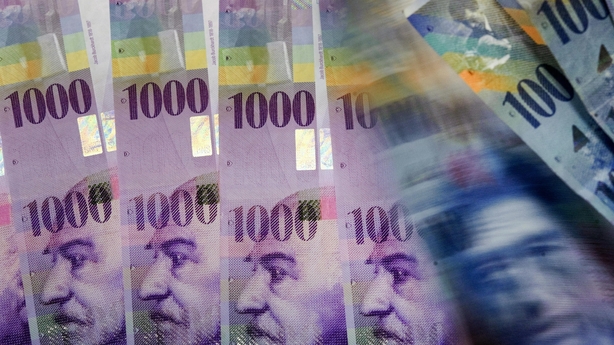The Swiss National Bank raised its policy interest rate for the first time in 15 years in a surprise move today and said it was ready to hike further, joining other central banks in tightening monetary policy to fight resurgent inflation.
The central bank increased its policy rate to -0.25% from the -0.75% level it has deployed since 2015, sending the safe-haven franc sharply higher.
Nearly all the economists polled by Reuters had expected the SNB to keep rates steady.
It was the first increase by the SNB since September 2007, and followed a 0.75% rate hike by the US Federal Reserve yesterday.
Other central banks are also raising interest rates as they attempt to cool inflation driven higher by surging fuel and food prices that are straining budgets for households and businesses.
The Bank of England also increased UK interest rates again today as it tries to tackle an inflation rate on course for double digits.
The European Central Bank signalled last week it would raise its rates in July to check euro zone inflation that hit 8.1% last month.
SNB Chairman Thomas Jordan said the inflation situation - with Switzerland seeing its highest price rises in nearly 14 years during May - meant the SNB may have to act again.
"The new inflation forecast shows that further increases in the policy rate may be necessary in the foreseeable future," he told a news conference.
Today's rate increase was necessary to check rising prices in Switzerland, which had spread to goods and services not previously affected by the impact of the war in Ukraine and supply chain bottlenecks linked to the pandemic.
"In the current environment, price increases were being passed on more quickly, and are also being more readily accepted, than was the case until recently," Jordan said.
"There is the threat of second-round effects becoming entrenched if inflation remains above 2% for a long period."
He said recent depreciation meant the Swiss franc was no longer highly valued on currency markets - long a concern for the SNB - and that the SNB was ready to intervene in markets to check excessive appreciation or weakening of the franc.
The safe-haven franc's strength had dampened the impact of inflation in Switzerland by reducing price rises for fuel and food imports, but this was less the case following its recent weakening, Jordan said.
"Thus the inflation imported from abroad has increased," he said. "Another consequence of this depreciation coupled with significantly higher inflation abroad is that the franc is no longer highly valued."
The SNB raised its inflation forecasts for 2022 to 2.8% from the 2.1% it gave in March.
It also expects inflation of 1.9% and 1.6% in 2023 and 2024, up from its previous view for prices rising by 0.9% in both years.
The SNB still expects the Swiss economy to grow by around 2.5% in 2022.
Swiss franc in biggest daily jump since 2015 after rate hike
Switzerland's franc soared today after the Swiss National Bank took markets by surprise with a large interest rate hike, putting the currency on track for its biggest one-day rise against the euro in more than seven years.
"It's telling of the general environment that even the previous doves are now worried about inflation," said Jan van Gerich, chief analyst at Nordea.

"The big picture remains that central banks are worried about being behind the curve and need to catch up," the analyst added.
The currency jumped almost 1.8% against the euro to 1.0198. It was headed for the biggest daily rise since January 2015 when the SNB unhooked the franc from its euro peg, sending the currency soaring.
Against the dollar, the franc rose 1.4%.
Swiss stocks plunged after the decision was announced, losing almost 3% and underperforming the pan-European STOXX index which fell 2%.
A Swiss equity trader said franc strength was adding to pressure on stocks in the exporter-heavy bourse, which is now close to confirming a bear market.
Shares in Switzerland's big banks Credit Suisse and UBS fell 3.3% and 4.8% respectively.
Swiss rate hike expectations were fanned by recent data showing inflation at a nearly 14-year high. The European Central Bank also signalled it will kick off rate hikes in July.
Analysts at currency broker Monex said Swiss inflation was mostly coming through the trade channel while the SNB unofficially targets a stronger inflation-adjusted franc rate to reduce imported inflation.
"Widening monetary policy differentials threatens this objective, hence warranting an earlier than expected rate hike. Today's decision to surprise markets has had the desired effect for the SNB as the euro-franc dropped over 1.5%," Monex wrote.
SNB Governor Thomas Jordan flagged more rate hikes ahead, noting the franc was not as highly valued as it used to be.

